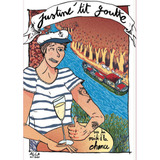Not available


Available bottle sizes:
Languedoc - France
Wine
White
Clairette, Grenache Blanc, Grenache Gris, Macabeu
none
none
Not available
Loading...
Opps
Sorry, it looks like some products are not available in selected quantity.
OK

Justine'tit goutte, 2022
Additional information
We currently only deliver within the UK
Buy 6 or more bottles for free delivery!

